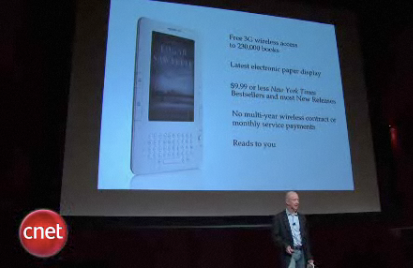The Author's Guild is Wrong About the Kindle. And That's Okay. They're the Authors.
By Harry McCracken | Friday, February 27, 2009 at 11:12 pm
 When it comes to thorny matters of intellectual property, my instinct is often to follow a philosophy which, as far as I can tell, almost nobody else shares. It’s a sort of creators’-rights libertarianism which you might call Let the People Who Create Stuff Make Their Own Damn Mistakes. (Possible alternative moniker: Reverse Lessigism.) The recording industry may have made almost every wrongheaded decision imaginable during the first decade 0f digital music, but hey–they’re entitled to drive their business into the ground if they so choose. And who the hell is is anyone else to angrily tell someone who created something what he can or can’t do with it?
When it comes to thorny matters of intellectual property, my instinct is often to follow a philosophy which, as far as I can tell, almost nobody else shares. It’s a sort of creators’-rights libertarianism which you might call Let the People Who Create Stuff Make Their Own Damn Mistakes. (Possible alternative moniker: Reverse Lessigism.) The recording industry may have made almost every wrongheaded decision imaginable during the first decade 0f digital music, but hey–they’re entitled to drive their business into the ground if they so choose. And who the hell is is anyone else to angrily tell someone who created something what he can or can’t do with it?
Ultimately, I think most owners of intellectual property will eventually come to decisions that serve the people who watch, listen to, or read their works, since behaving too stupidly for too long will leave you without any customers. But it’s OK by me if creators find their own comfort level, even if it’s different from what I’d choose.
(Side note: You may well argue that it’s artists, not industries, that create things…and you’d be right. Possible fodder for the comments, or for a future post.)
All of which is a roundabout way of getting to today’s news that Amazon has responded to the Author’s’ Guild’s angst over the Kindle 2’s text-to-speech book reading feature by letting publishers decide whether the feature should be enabled on a particular book or not.
(Shameless plug: Here’s my review of the Kindle 2. I liked it–and will continue to like it even if I can’t listen to books in a surprisingly-good-but-still-robotic voice.)
The Author’s Guild maintains that the Kindle feature violates copyright by being something akin to a public performance and endangers writers’ livelihoods by competing with audiobooks; Amazon says that it’s legal and is good for the industry, but it believes “many rightsholders will be more comfortable with the text-to-speech feature if they are in the driver’s seat.”
(Additional side note: Engadget did a good interview with Paul Aiken of the Author’s Guild–read it for the Guild’s stance and see for yourself how good a case he makes.)
Amazon, which has done an admirable job of getting publishers on the Kindle bandwagon–to the tune of a quarter-million books to date–was obviously in a tough spot. Publishers who are uncomfortable with the Kindle might withhold rights. No books, no successful Kindle. And if the Kindle failed, it would be a huge problem for the whole nascent concept of e-books.
I do have an opinion here, and it’s pretty much the same one as my friend Steve Wildstrom of BusinessWeek: The Kindle is good for the book business, not bad, and the more cool features it has, the better. And if I’d written any books, I’d enable Kindle text-to-speech in a heartbeat. What I’d be worried about is technology allowing people to pirate books–not technology letting people who pay for books enjoy them in new ways,
But that’s me. Let the People Who Create Stuff Make Their Own Damn Mistakes, I say–even if hurts their chances of making money off their works.
(Final side note: I know at least one person who wrote two books that available both on the Kindle and in audiobook form, and whose take on this matter I’d value. She happens to be my sister, and I just dropped her a note to see what her stance is on text-to-speech.)
Okay, now for an entirely different aspect of this development. It was just weeks ago that Jeff Bezos stood on stage talking up the Kindle 2:

He talked up the text-to-speech and told prospective customers that “When you want it to, it reads to you.” Amazon is now saying, basically, that the Kindle will read to owners when the publishers want it to–even though it says that there was nothing illegal with the feature. I assume that Amazon will push out a software update that disables universal text-to-speech.
Amazon has amended its description of text-to-speech to say that it works “unless the book is disabled by the rights holder.” But the video on its Kindle page still says the feature works, period:

So here’s a question for you: Is it kosher for tech companies to yank features in products they already sold you simply because they changed their mind about whether they were such a great idea?
7 Comments
Read more:
6 Comments For This Post
1 Trackbacks For This Post
-
Amazon caves on text to speech « TechWag Says:
February 28th, 2009 at 5:56 am[…] The Author’s Guild is Wrong About the Kindle. And That’s Okay. They’re the Authors… (technologizer.com) […]













February 28th, 2009 at 6:42 am
Text-to-speech wasn’t the primary factor in my decision to buy a Kindle 2, but it was one of the factors I weighed when making my purchasing decision. And I’m not too happy that amazon can pull back a feature that they promised me. In my opinion, they ought to be making some kind of gesture to their customers as well when they do this — if only to remind us that our opinions are as valuable as publishers are.
February 28th, 2009 at 1:58 pm
On reflection, I’m inclined to agree with the authors, and to think Amazon’s legal position is actually quite weak, long term. An audio presentation is not the same product as words on the Kindle screen. If the authors wish to sell only the latter, or a bundle of the two, that should indeed be entirely up to them. Suppose synthesis technology developed to the point where the Kindle, or something like it, could produce not just an annoying digital voice, but a 3-D holographic projection of the action, entirely extrapolated from the words and the device’s own programming. Science fiction, yes, for now–but is there a fundamental difference?
February 28th, 2009 at 9:04 pm
I’m a published author and subscribe to your Let the People Who Create Stuff Make Their Own Damn Mistakes philosophy too. I think it will take a bit to sort out these issues with the Kindle. In the long run though, even though many authors may not know it yet, the Kindle is one of the best things to happen to the business of writing.
February 28th, 2009 at 10:24 pm
So if I am a blind or visually impaired person and I purchase the Kindle so that I can utilize the text to speech (TTS) feature on it, will I now be discriminated if it were to be removed. Will I be forced to only purchase braille versions or audio tapes/CDs of the books? TTS technology has been around for years; it does not infringe upon the royalties paid to “read” the written word. It is not like having a paid professional speaker verbally read the book back like that of an audio tape/CD version of the book.
Is the Writer’s Guild pressing this issue hard? …or is it just a few writers who think that they go up against Amazon to try to make another buck or two? I think the Kindle will be a boon to the publishing industry as a whole and that the majority of writers will not only get more exposure …but also a few more dollars.
…or the Writer’s Guild will fight to get either a couple more dollars or the muting of TTS; either way the end result will be hurting or killing this technology, inconveniencing the new techie readers and having blind and visually impaired people then sue the Writers’ Guild for discrimination
…and the only winners will be lawyers.
March 2nd, 2009 at 2:06 am
Hi,
That’s a tricky one! Personally as a consumer I think it should be included but as an author I know that I might want to have the text and speech separate.
WHy don’t Amazon just bundle this all up? I would be happy with that.
M
March 2nd, 2009 at 5:02 pm
I wish it were that simple, Harry.
You say “Let the People Who Create Stuff Make Their Own Damn Mistakes” and then cite the record companies as an example. But, even though they claim to own the music, the record companies didn’t create it. The artists did. In many cases that creation happened decades ago and the artists are long dead. But still the record companies assert ownership. In fact, they assert continued ownership of music that consumers have already bought!
Also, the mistakes that get made can do more than just harm the businesses of the people who makes those mistakes. And those people have to take responsibility for the collateral damage.